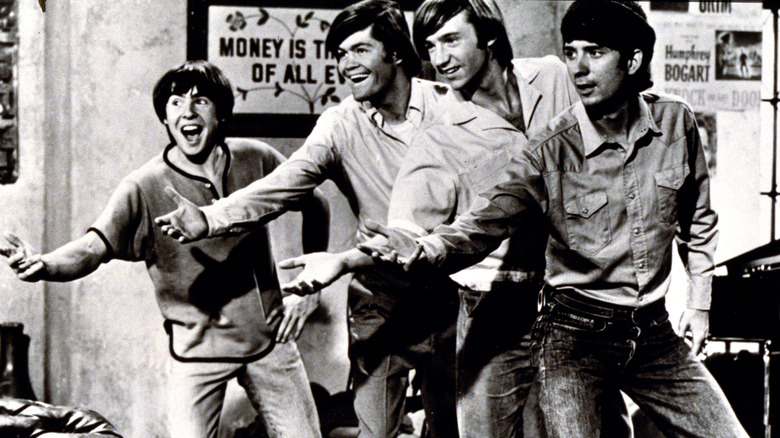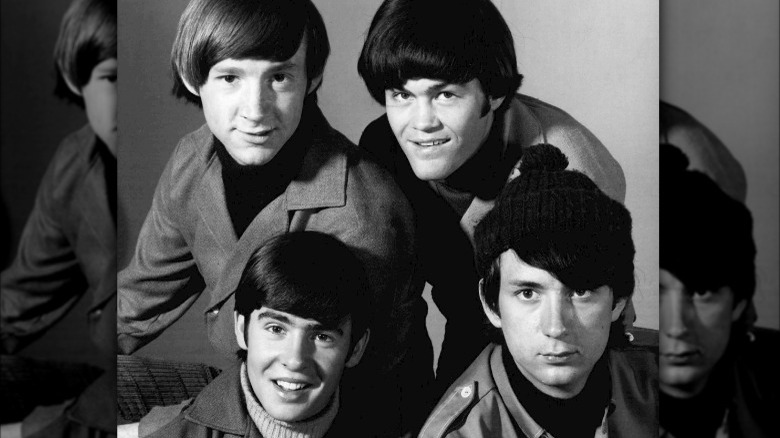The FBI Files On The Monkees Explained
The 1960s were nothing if not a unique era. Marked by the transition from the buttoned-up life of the 1950s to the wild-and-free spirit of the 1970s, the sixties were full of cultural icons and transformations, including the Civil Rights era (via History), the rise of the counterculture movement, and the establishment of new musical icons like the Beatles (via Britannica).
According to Britannica, The Monkees also came on the scene in the 1960s. A made-for-TV band, The Monkees were created at a time when the obsession with the Beatles reached an incredible frenzy. The Monkees had four members: Micky Dolenz on drums, Mike Nesmith on guitar, Peter Tork on bass, and Davy Jones as lead singer (via Biography). Even the band members had varying musical backgrounds, they were still a smash hit. The Monkees' TV show ran between 1966 and 1968, followed by a feature film, "Head" (which has a moderately impressive score of 71% on Rotten Tomatoes). Additionally, The Monkees have sold over 65 million albums worldwide (via Deadline).
With that fame came plenty of attention — including from places you might not expect. Like many young people of their day, The Monkees sometimes expressed liberal political views, putting them on the radar to receive some significant surveillance by the U.S. Federal Bureau of Investigation (FBI).
FBI surveillance in the 1960s
The FBI was once intended as an intelligence agency, per the U.S. Department of Justice. But during the 1960s, the Bureau was often used as a tool against radicals who protested the Vietnam War. Surveillance was used against a range of different organizations, groups, and people to discover potential threats. The Monkees found themselves under surveillance during this time.
While the details of the FBI's surveillance were not disclosed at the time, members of the band became aware that the FBI had surveilled them later on, according to The Guardian. A heavily redacted document was released in 2011 showing that The Monkees were investigated because of anti-Vietnam War sentiment. Additionally, they were investigated for other reasons during the same period, though what they were remains unknown (via CNN).
The redacted document reveals that The Monkees were investigated partly because of a visual display they'd put on at one of their concerts. The file from the FBI states that The Monkees had a predominantly-teenage audience at one of the band's concerts and that there was a screen displaying images during it. The file goes on to state, "During the concert, subliminal messages were depicted on the screen, which, in the opinion of [REDACTED] constituted 'left wing innovations of a political nature.' These messages and pictures were flashes of riots in Berkeley, anti-U.S. messages on the war in Vietnam, racial riots in Selma, Alabama, and similar messages which had received unfavorable response from the audience."
Dolenz sues the FBI
According to CNN, Micky Dolenz filed a Freedom of Information Act (FOIA) Request to obtain uncensored copies of the surveillance files in 2022. Per FOIA policies, a request can be made for any agency record. In turn, the agency must comply unless the documents meet certain exemption criteria, like containing trade secrets or information that could threaten national security (per FOIA). According to the Department of Justice, a petitioner must receive a response to their request within twenty business days of filing it.
However, while Dolenz filed his request for the uncensored files, the FBI did not respond promptly, according to The Guardian. For that reason, Dolenz decided to sue the FBI to obtain copies of the records. As the lawsuit states, "This lawsuit is designed to obtain any records the FBI created and/or possesses on the Monkees as well as its individual members. Mr. Dolenz has exhausted all necessary required administrative remedies with respect to his [FOIA] request."
Now only time will tell the outcome of the suit and what secrets might be hidden in the redacted files.


